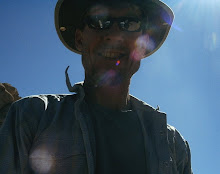
Six-hundred riders
chase the Lion of Flanders
Up. Down. Up. Down. Up.
On Saturday I joined a bunch of other cyclist, including about a half-dozen guys associated in one way or another with the team, for de Ronde van Oeste Portlandia. I did this ride last year and was glad to have some friends along for the suffering this time. The weather was beautiful - really, the nicest day so far this year, which probably helped drive the turnout, which was estimated over 600. I think that's incredible for something that's unofficial and just organized by word-of-mouth and the net. You can read more about it here and here.

Unfortunately, one of our teammates, John, was seriously injured on one of the descents when a driver made a left turn directly in front of him and a group of riders. John was probably traveling 30+ mph and the accident sent him over the truck and left him with a badly broken leg and numerous other injuries. Our group had been split in half by a wrong turn a little earlier, and I came upon the scene a couple minutes after the crash. Fortunately, John was conscious and

responsive, but he was in a lot of pain. There's no telling for sure, of course, but what I saw was as good an argument for the value of a helmet as I have ever seen. We were all left fairly shell-shocked, and those who were literally at his side when the collision took place were quite traumatized. The comment that most struck me was "it looked like a bike explosion."
In a previous post I talked about the price we as a culture seem willing to pay in order to drive. For me, this tragedy puts a violent and angry exclamation on that. I'm sick of what feels like the senseless brutality that drivers of cars inflict on vulnerable cyclist and pedestrians. And I'm sick of the voices that dare to say that cyclist and pedestrians are somehow to blame because the roads were made for cars. I refuse to use the term "accident" for this type of violence because to do so implies that it was inevitable, and that there wasn't a human at fault when there was. I'm not claiming the driver assaulted John, but when someone is at the wheel of a car and his recklessness or lack of attention or poor driving skills cause injury, a crime has been committed. I don't say this out of malice toward the driver, who, if he's like most of us, must feel sick with remorse. But I say it because I believe that if things are ever going to change - if road safety for all users is ever going to be a priority, we need to see more bad drivers charged with a crime. I hate saying this, because I take no pleasure in anyone's punishment, regardless of what they have done. But the close calls are beginning to wear on me and those who love me. Those of us who choose to regularly commute by bike can recount frightening close calls by the dozens. And despite the familiarity with bikes that inner-Portland drivers have (and bless their hearts most of them are great at sharing the road), there's still far too much selfishness and aggression out there. I want the driver who hit John charged with a crime not because I want him punished, but because I want the rest of the drivers out there to get the message that they must take the responsibility of getting behind the wheel as serious as a heart attack. I want the same rules for the road that I have for my classroom - that is, doing the wrong thing must be harder and more uncomfortable than doing the right thing. When a motorist can send a cyclist to the hospital and get back behind the wheel and drive home, something is seriously wrong.
Face It
Your car, like mine
cannot leap through giant hoops of fire
or loop, upside down, in gleaming tunnels of steel
it cannot scale cliffs, ascend roadless peaks
or plow through towering drifts of snow
your car will never speed across Bonneville,
cut midnight cookies in New York City,
or drag race in a parking garage
Your car is not sexy
and doesn't make you sexy either
it is not a weapon or a toy
it does not symbolize freedom
independence America power
an animal or you
Your car, like mine
is an appliance
like a washing machine or a refrigerator
good to have
necessary to the job at hand
a tool fit to its purpose
and when your car has been used with gratitude
and carefully kept from carnage
guided through neighborhood streets
gently purring past children as they play
at the end of the age of the auto
your car, like mine
will come to a stop
maybe in a quiet pasture
to rest and rust and return
until all that remains
is a dull orange headstone
leeching iron back into the earth
photos by Dave Roth


